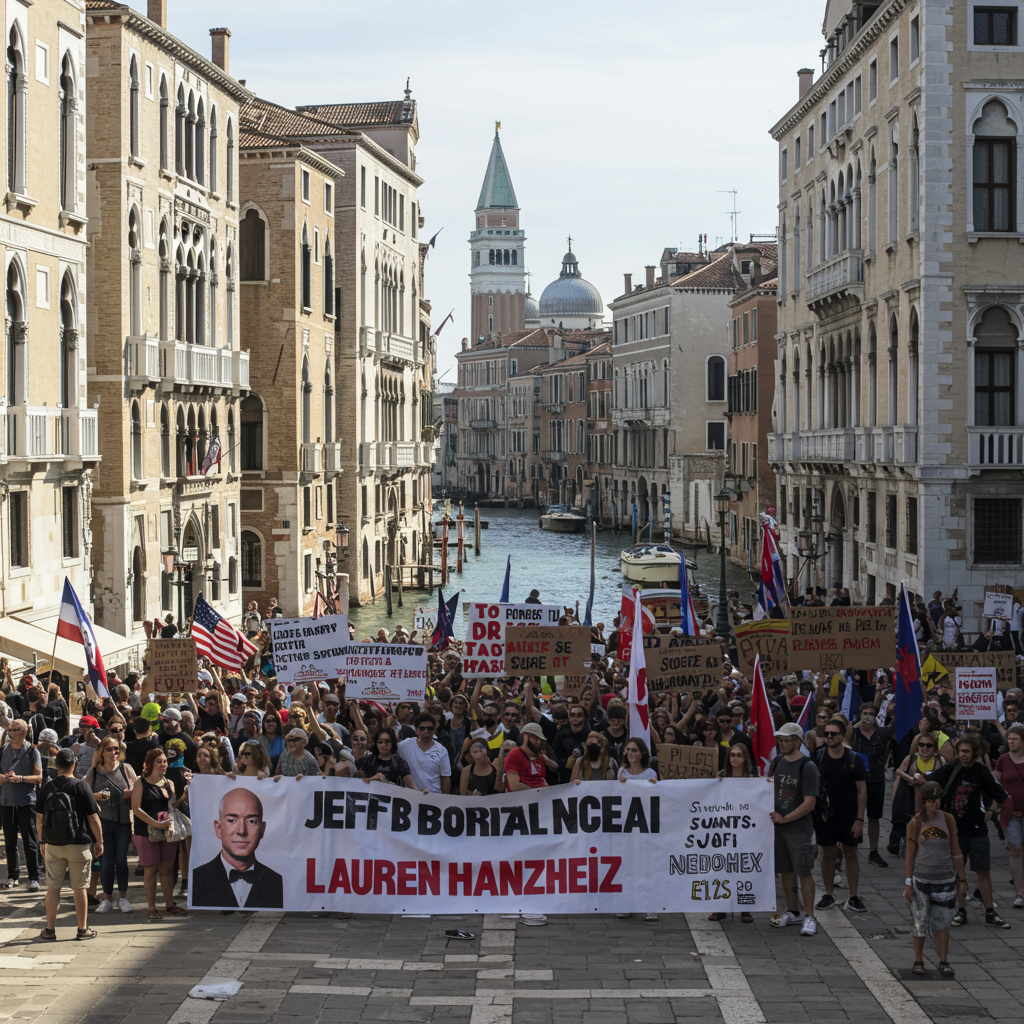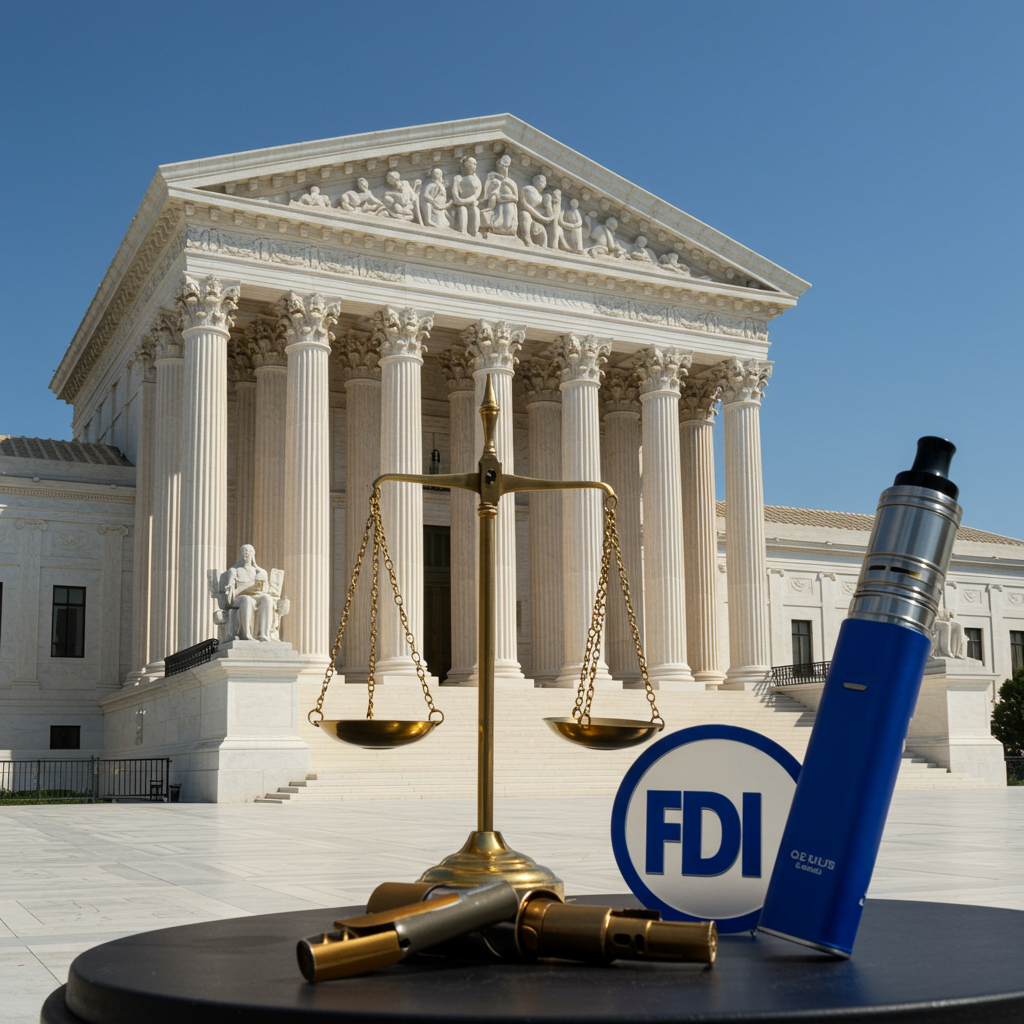Venice, Italy, a city grappling with the pressures of mass tourism and preservation, became the backdrop for a striking display of dissent during the multi-day wedding celebrations of Amazon founder Jeff Bezos and Lauren Sanchez. As guests gathered for the high-profile event, held just days after the couple tied the knot on Friday, a few hundred local residents and activists took to the streets and canals on Saturday. Their message for the billionaire and his bride was unequivocal: demanding they leave the city.
Protesters converged at a city train station before embarking on a march through the historic center. The atmosphere was charged, with demonstrators chanting slogans in Italian, including a blunt “Bezos, fk off” and the widely adopted cry, “Out of our lagoon!” This sentiment wasn’t just verbal; it appeared on signs, notably a Shrek-themed placard featuring the character’s ears on the word “lagoon” and even a Spotify link to the movie’s theme song.
Voices from the Demonstration
The reasons behind the protest were multifaceted, extending far beyond simple opposition to a wedding. Many demonstrators voiced deep-seated grievances about wealth inequality, the perceived impact of extreme wealth on historic cities like Venice, and even the working conditions at Amazon itself.
One woman, identifying herself as an Amazon worker, highlighted the stark contrast between the lavish event and the daily struggles of employees. “We can barely pay the rent,” she told the crowd, emphasizing the difficulty many faced commuting to warehouses and making ends meet. “We make do… we don’t see these millions.”
Austrian protester Hans Peter Martin articulated a feeling that the city was being disrespected. He stated that Bezos “has such a lot of power” and was “abusing this city as a place to show off.” For him, this meant the billionaire was “not welcome here.”
Deeper Roots of Venetian Discontent
The demonstration tapped into significant existing anxieties within Venice, particularly concerning overtourism and its effects. Activists argued that hosting such an extravagant affair treated Venice as a “private ballroom,” prioritizing wealthy visitors over the needs of its struggling residents. The city faces significant challenges, including being a “sinking city” due to rising sea levels and the impact of mass tourism, which fuels a housing crisis by converting residential properties into short-term rentals and contributes to a declining local population.
Protesters belonging to groups like “No Space for Bezos” and Greenpeace Italy made their presence felt with prominent banners. Greenpeace displayed a large banner in St. Mark’s Square featuring Bezos’s picture and the pointed message: “If you can rent Venice for your wedding you can pay more tax.” The environmental group further alleged on social media that Bezos “pays his staff poverty wages and dodges tax,” arguing his ability to fund a costly wedding underscored the need to “Tax billionaires NOW.”
Other slogans around the city, like “Veniceland: A playground fit for an oligarch” and “No space for Bezos,” reinforced the sentiment that the event was emblematic of ultra-wealthy individuals imposing themselves on the fragile city. Some activists reportedly planned disruptions like blocking canals or streets. The display wasn’t limited to political or economic statements; at least one sign lightened the mood with a critique of the couple’s fashion sense: “Money Can’t Buy Style.” Many demonstrators also held aloft Amazon boxes marked with messages like “Rejected” or “No Space for Bezos,” turning the symbol of Bezos’s empire against him.
The Economic Debate and Wedding Logistics
Despite the vocal opposition, the wedding was also viewed by some, including city officials, as a potential economic boon. Venice’s Ministry of Tourism suggested the three-day event, reportedly costing $55 million, could generate a significant boost, potentially contributing almost 68% of the city’s annual tourism turnover.
Wedding planners, Lanza & Baucina Limited, responded to the backlash by defending their approach. They stated that their clients, Bezos and Sanchez, had specifically instructed them to minimize disruption to the city, respect residents and institutions, and prioritize employing local Venetians for the festivities. The planners denied rumors of the couple “taking over” the city or excessively booking water taxis, emphasizing months of work to ensure a minimal negative impact.
Furthermore, efforts were reportedly made by Bezos and Sanchez to support the city. They were said to have quietly donated to Venetian charities in April and made wedding guest donations in honor of guests. Reports also indicated they sourced 80% of the supplies for the three-day celebration from Venetian vendors. Bezos’s Earth Fund made a substantial one-million-euro donation to Corila, an academic consortium dedicated to studying the delicate lagoon ecosystem. City officials praised this specific act as genuine support for the city.
City Officials’ Response and Differing Local Views
Venice city officials largely dismissed the protests and welcomed the wedding. Mayor Luigi Brugnaro anticipated a “multi-million dollar” economic impact and viewed the event as highlighting the city’s appeal for high-profile functions. Tourism councilor Simone Venturini described the protesters as a small group of “professional protesters” driven by “social envy,” seeking media attention. He asserted that Venice remained open and welcoming to visitors. The municipal government went further in a press release, denouncing the demonstrators as “ridiculous” and “grotesque” and suggesting they had “exceeded all limits of common sense,” descending into the “folklore of ‘No to everything.’” Mayor Brugnaro even expressed shame regarding the protests and hoped Bezos would not be deterred from visiting despite them.
However, not all locals shared the protesters’ sentiments. Some Venetians, like Sandro Mattei and local pastry maker Antonio Rosa Salva, welcomed the wedding. They saw it as a prestigious event bringing high-level tourism, which they considered vital for the local economy, benefiting luxury hotels, restaurants, and commerce.
The juxtaposition of a celebrity wedding in a world-renowned, yet fragile, historic city like Venice became a focal point for expressing pre-existing social and economic tensions. The event highlighted the ongoing debate between embracing global wealth and luxury tourism for potential economic gain versus addressing critical local issues like housing affordability, environmental preservation, and the quality of life for residents.
Frequently Asked Questions
Why were people protesting Jeff Bezos’s wedding in Venice?
Protests during Jeff Bezos’s wedding festivities in Venice stemmed from multiple issues. Demonstrators cited wealth inequality, arguing that billionaires should pay more taxes. They also protested against the impact of extreme wealth on cities like Venice, highlighting concerns about overtourism, the local housing crisis exacerbated by short-term rentals, and the feeling that the city was being treated merely as a playground for the ultra-rich. Grievances about Amazon worker conditions were also expressed.
What were the specific demands and concerns raised by the protesters?
Protesters used chants like “Out of our lagoon!” and displayed signs demanding Bezos “get out.” Specific concerns included demands for higher taxes on billionaires, critiquing the scale of wealth displayed in contrast to worker struggles (“We can barely pay the rent”), and opposition to Venice being overwhelmed by VIP tourism at the expense of residents. Groups like Greenpeace also focused on tax avoidance and worker wages, while others simply expressed anger at the opulent display in a city facing significant challenges.
How did Venice city officials and the wedding planners respond to the protests?
Venice city officials largely dismissed the protests as “ridiculous,” “grotesque,” and driven by “social envy.” They welcomed the wedding, viewing it as an event that would bring significant economic benefits and highlight the city’s ability to host major functions. Wedding planners stated they had worked for months to minimize disruption, respect residents, and hire local vendors, denying claims that the couple was “taking over” the city or causing excessive disturbance. They also mentioned the couple’s donations to local charities and lagoon preservation efforts.
—
Ultimately, the wedding and the ensuing protests underscored the complex balance Venice faces: leveraging its global fame and appeal to attract tourism and investment while simultaneously preserving its delicate environment, addressing the needs of its dwindling resident population, and navigating the global conversation around wealth, taxation, and social responsibility. The event became a temporary stage for these fundamental tensions to play out in a very public way.




